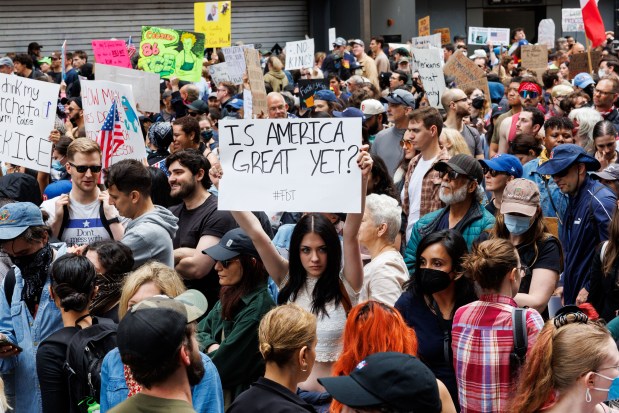Now that lawmakers have adjourned for the summer, it’s safe for us to wander about the magnificent miles of Illinois. On roads, it seems, paved with gold.
That’s because the Democrat-controlled legislature late last month adopted a $53.1 billion budget for fiscal year 2025. Even with a supermajority of 78 seats in the House, a handful of Democrats balked at the more than $1.1 billion in revenue hikes needed to balance the budget.
Perhaps they, like many of us, are getting tired of the unending and undisciplined tax-and-spend formula prevalent in the Land of Lincoln. With some creative accounting, the state has a budget balanced on the back of substantial tax increases on sportsbooks and video gaming, along with a static hotel tax and business assessments.
In the budget, adopted with party-line votes and signed into law last week by Gov J.B. Pritzker, spending grew by about 5% from last year’s budget package. That’s the same percentage of the pay hike representatives and senators gifted themselves.
While our lawmakers crow about the plans and programs in legislative districts allegedly benefitting us in the new budget document, they will quietly ignore their own 5% raise. Under Illinois law, legislators’ pay is tied to inflationary increases. They could have voted not to implement that increase, or approve a lower amount.
Of course, they took no action to stop the hefty hike. Few in the private sector can look toward a 5% pay increase this year.
No matter. The lawmakers’ boost puts their base salary at $93,712 a year. Not a bad take-home pay for what is essentially supposed to be a part-time gig. And, they get to use campaign funds for all sorts of promotions and uses.
Most Illinois legislators make more than six figures, some of the highest legislative salaries in the nation, following lawmakers in New York who bring home a minimum of $142,000 a year. Through committee chairmanships and leadership posts, Illinois lawmakers can rack up even more income.
Then there are the cushy state pensions, which remain $145 billion in long-term debt. While working for us, our legislators are also working for themselves. Percentage-wise, community college and public university funding received a mere 2% bump, about $30 million, during the recently concluded legislative gathering.
From that session which ended in a mad rush to adjourn, shoppers got a miniscule tax break with the elimination of the 1% tax on groceries. Don’t rush out and expect your grocery bill to be reduced this week.
Elimination of the tax takes effect Jan. 1, 2026. Already, municipal leaders are complaining it will take revenue away from their communities.
Although they’ve got nearly two years to find alternatives, they should start cracking rather than wait for last-minute replacements, as our legislature is wont to do. Home-rule communities can enact their own grocery tax of up to 1%, according to state law, if they dare, without seeking voter approval.
Lawmakers also provided a Child Tax Credit for families amounting to some $50 million in tax breaks. That will be financed by the aforementioned increased “revenue enhancements” on sports wagering and video gambling. That gaming golden egg can lose its shine quickly with increased taxation.
The current 15% tax rate on sportsbooks’ profits will increase with a graduated structure that will tax between 20% and 40%, depending on their earnings. A percentage point increase to the tax on the state’s video gambling industry is expected to generate an additional $35 million.
The budget also includes more than $180 million in additional funding to gain housing for asylum seekers bused to the region mainly from Texas. More of them are expected to arrive this summer when the Democratic National Convention gets underway in August.
The money is for moving asylum seekers, most of them in Chicago, into permanent residences instead of temporary shelters, along with turning buildings now being used for that purpose back into public facilities. Money also is set aside for medical spending for the immigrants.
Full disclosure: Among the billions in the budget set aside for programs is a $5 million tax credit program for news outlets beginning in 2025 and claimable the next year. That should benefit local journalism across Illinois.
As for those roads paved with gold, lawmakers made sure money would be spent for our driving and commuting pleasures. Some $3.5 billion is set aside for infrastructure improvements.
Another $400 million will be in the pipeline for municipalities to share for local road projects across Illinois. Now that sounds magnificent, unless you’re stuck in highway construction traffic.
Charles Selle is a former News-Sun reporter, political editor and editor.
sellenews@gmail.com
Twitter: @sellenews




